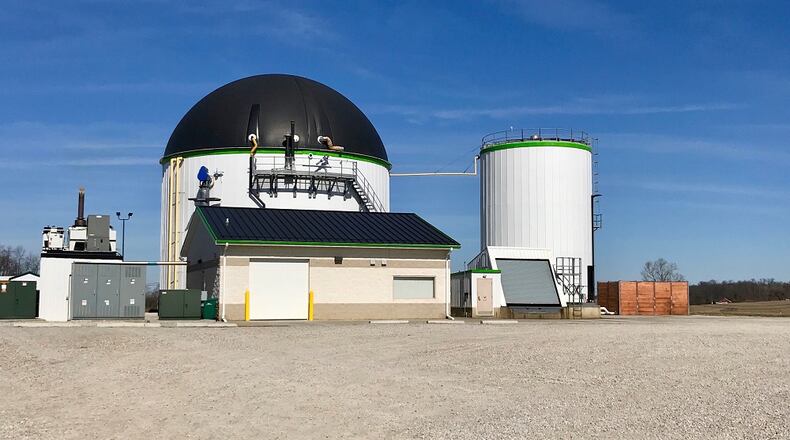What is a biodigester?
A biodigester is a device or structure in which the digestion of organic waste matter by bacteria takes place with the production of a burnable biogas and a nutrient-rich slurry.
The Ohio Environmental Protection Agency will host a public hearing tonight on plans to add two large storage ponds at a biodigester farm in Greene County.
The 6 p.m. meeting will be at the Wright State University Student Union Apollo Room, 3640 Colonel Glenn Highway. A project presentation by Dovetail Energy, also known as Renergy, will be provided before questions can be asked and public comments can be made.
Dovetail Energy wants to build two synthetically lined ponds on the property, which is owned by Bath Twp. Trustee Tom Pitstick, to be used to store the biosolids material after it has been processed and treated through the biodigester operation.
RELATED: Greene County facility that neighbors call smelly and heavy on traffic gets approval to expand
If approved, the project will enable the biodigester farm to irrigate local farm fields used to grow crops for animals, not humans, instead of hauling it away, according to Logan Randles, head of the soil and water division of Renergy.
“It will give us the ability to further treat that material … We will use these ponds to provide irrigation water to nearby fields,” Randles said. “It’s a big deal for us. We’ve been looking forward to it for a long time.”
Randles said the added storage space for the material will result in less truck traffic going to and from the farm, and less odor from the stored effluent, which neighbors have complained about in the past.
Neighbors have filed complaints about odor and truck traffic associated with the farm, where biosolids from municipal treatment facilities and other sources is turned into gas, which is then used to generate electricity. The proposed ponds would store the by-product after those processes, which can then be used as fertilizer.
The Dayton Daily News first reported about neighbors concerns over the farm in February 2018, when residents Kassie and Ron Lester filed official complaints with the Ohio EPA and challenged the farm’s agricultural zoning designation.
The zoning challenge was denied, but the Lesters filed a complaint with the county auditor’s office, and the board of revisions ruled that part of the farm should be classified as industrial for tax purposes.
Greene County Auditor David Graham said the board determined that about five acres of the farm should be taxed as industrial activity and not qualify for the Current Agricultural Use Value program. CAUV rules stipulate that 50 percent or more of the biomaterial processed in the operation come from local farms, and that was not happening, Graham said.
Graham said Renergy was a day late in filing an appeal on the decision, adding that because of the size of the farm, losing the CAUV tax advantage on part of it probably didn’t have a huge impact on the company’s bottom line.
Kassie Lester said they are still pursuing what they see as a zoning violation and an out-of-county zoning official is being brought in to determine whether the township has erred in its zoning designation for the farm.
“We have to safeguard our environment. It’s sad the EPA permits it. They don’t seem to be safeguarding our environment.”
STAY CONNECTED:Greene County News on Facebook
The design of the proposed ponds, which would have a combined capacity of holding 32-million gallons, includes a leak detection system and conditions have been imposed that would require about a foot of space at the top to prevent overflow, said Dina Pierce, Ohio EPA spokeswoman.
“We want to hear from people … We want to try to address people’s concerns,” Pierce said.
Public comments will be recorded and considered before a decision is made whether to grant the permit, Pierce said.
The Ohio EPA will accept written comments until July 3. Written comments can be sent via email to epa.dswcomments@epa.ohio.gov, or mailed to Ohio EPA-DSW, Permits Processing Unit, P.O. Box 1049, Columbus, Ohio 43216-1049.
About the Author
